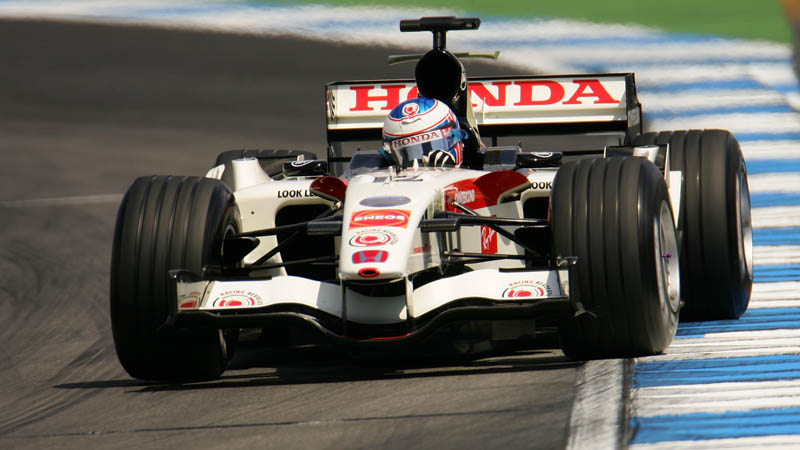Babies Whine. Girls Scream. Engines Growl
 |
| Jenson Button and Honda Racing in action during the German Formula One Grand Prix at the Hockenheimring on July 30, 2006 |
So the big news from Formula 1 last week was the audio release demonstrating the sound of the new Honda engine. You can listen to it here.
Honda released the audio track to legions of F1 fans who glory in the sound of high revving engines. True enough, there is little in life to beat the enthralling sound of a race engine at fever pitch.
But as I sat in the office last week enjoying my morning Irish breakfast tea and listening to the Honda engine scream on YouTube, a funny thing happened.
Sitting across from my desk, our TV director heard the sound and looked up at me.
“Go kart?"
“Formula One."
“Well it sounds like a go kart."
 |
| 1988 Honda RA168E turbo engine used by the Camel Team Lotus |
Personally, I thought it sounded more like an air raid siren. Snooping around online, others likened it to a Husqvarna chainsaw, a vacuum cleaner or a weed whacker, which pretty much sums up the public response.
It's not that Honda's engine sounds bad. And yes, there is a place in the world for the high-pitched whine of a racing engine at full song. I get that. Ferrari has raised it to an art form. And in fairness, once Honda's new engine is out on a race track and under a full load, it will likely sound much better.
But it just seems a shame that everyone in open wheel racing nowadays is emasculating the gnarly, ground-trembling roar of a naturally-aspirated V8, V10 or V12 engine as a matter of course. Please note that I'm not really referring to volume, but tone. Louder isn't necessarily better. NASCAR proved that long ago. I just believe that engines should project an ambiance of power and that fans almost universally respond in a positive manner when it is offered.
IndyCar has regressed to turbocharged V6's. Oh, the shame. Granted, they sound about as good as a V6 will ever sound and they are pleasingly quiet. I didn't even need ear protection while sitting high in Turn 3 at this year's Indianapolis 500. But IndyCar's V6 engines do not sound fearsome or amazing, and they do not exude power.
At first I thought that perhaps I was making too much of this. Then it occurred to me. When people begin comparing the world's most advanced racing engines to weed whackers, we know we have a problem. As Steve Martin told Chevy Chase in The Three Amigos, “This is real."
Strange to think that this problem is relatively new. Take a listen to these engines. For all the things the Indy Racing League may have done wrong, their engines sounded so horrible fans had to wear ear plugs to avoid hearing loss. And that was some sixteen years ago.
And how about this little beauty? That is the fearsome rumble of a Can Am engine from the early 1970's. Man alive. Race fans had it good back then.
And I would be remiss if I didn't give a nod to short trackers everywhere, whose engines have sung beautifully since the first modern V8 rolled off the assembly over half a century ago.
Of course, the answer to this nonsensical plague upon the ear is quite simple. The world's most over-regulated sport should stop regulating engines. Run what ya brung, whatever that might be. At least Vince Granatelli’s turbine IndyCar sounded fun and interesting. And anyone who says small engines can't sound amazing hasn't heard Jim Clark's Lotus IndyCar.
Freedom breeds variety, which is its own reward. In an unregulated environment, most engines would sound great. A few might still sound lame. So be it. Race fans will revel in the difference rather than fall asleep to a symphony of sameness.
Instead of endless engine regulations, every race series should focus on limiting mechanical grip (mandate narrow tires) and aerodynamic grip (eliminate wings). Make all the power you want. The trick is hooking it up.
When that day comes, cars will be sliding again, drivers will be driving again, and Formula 1's latest high-tech engines will no longer be mistaken for a herd of runaway go karts.
Oh, happy day.
Stephen Cox
McGunegill Engine Performance/Boschett Timepieces #31

